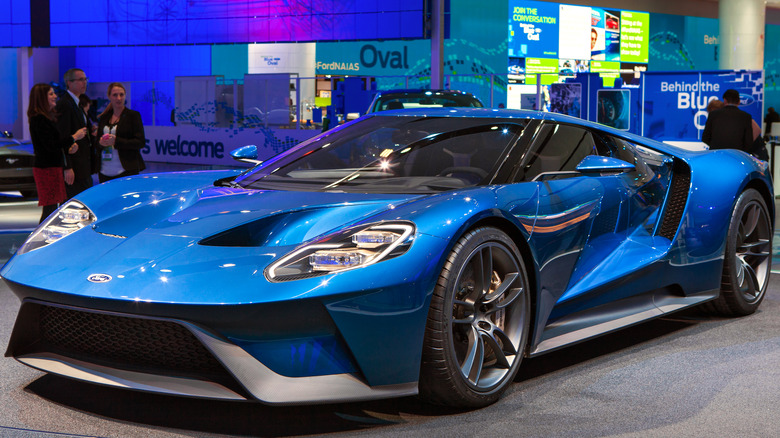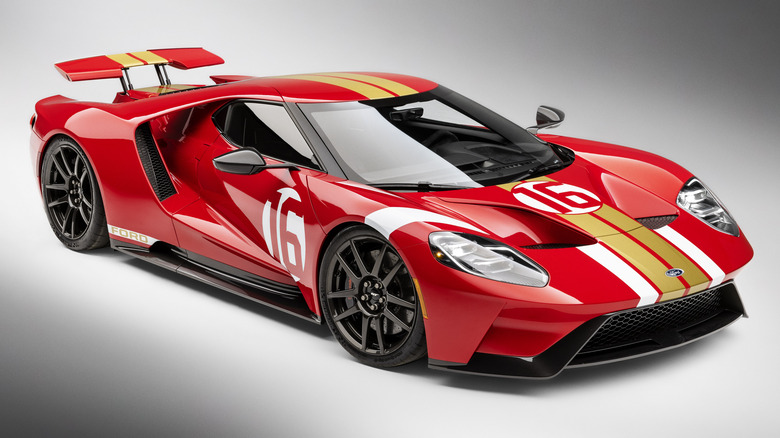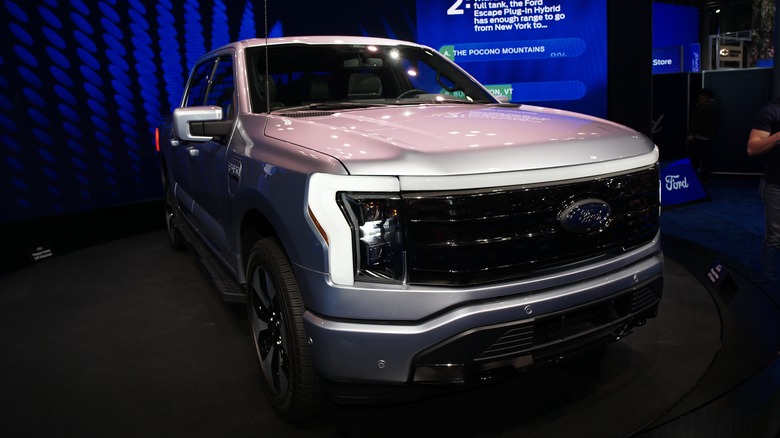The Real Reason Why Ford Sued John Cena
The second-generation of the Ford GT remains one of the most sought after muscle cars on American roads. Supply has deliberately been kept tight in order to preserve the exclusivity of owning one, with roughly one model rolling off Ford's production lines each day since it launched in 2016 (via Road and Track). It's undoubtedly an incredible vehicle, as it should be for a supercar priced between $450,000 and $500,000.
That sort of money buys you an aggressive sports car design with a twin-turbocharged intercooled 3.5L EcoBoost V6 that delivers a prodigious 660 horsepower, a lightweight body made of carbon fiber, track-ready sports suspension, and Brembo carbon-ceramic anchors designed to deliver incredibly responsive race car-like braking. Naturally, when it went on sale in 2016, the initial allotment of 500 cars was massively oversubscribed with 6,506 fully completed applications, according to Ford.
Of course, A-list celebrities were lining up to get one including renowned revhead wrestler and movie star John Cena. He managed to get his hands on a stunning GT in liquid blue in October of 2017. It didn't take long, however, for things to go pear-shaped (via Hot Cars).
When the shoe doesn't fit
With demand far outstretching supply of its GT, Ford implemented an "anti-flip" clause in the purchase contract for the vehicle that prevented new owners from buying a GT only to re-sell it on the second-hand market for a mark-up within the first 24 months of ownership. Despite this, John Cena sold his a month after purchasing it, with just 30 miles on the odometer. And he made a pretty penny, offering it to a retired farmer for about $1.54 million — roughly triple its original price (via Top Speed). Despite being a fan of the car, Cena reportedly had a lot of trouble getting in and out of his Ford GT because of his considerable stature and muscular bulk, prompting the sale.
Unfortunately for Cena, when Ford got wind of the deal, the company sued him and the dealer that resold the car. Several months after the initial suit was brought against Cena by Ford, Cena's legal team announced that it had reached a settlement with Ford, with the proceeds going to a charity. The statement included comments from Cena who stated his love for the brand and urged other Ford GT owners to honor their contracts.
The last current gen Ford GT will roll off the line this year
The Ford GT was originally slated for a production run of 1,000 cars to be manufactured between 2016 and 2020, at the rate of around one new model rolling off the production line each day. Every model is the culmination of a build process that lasts nine days in a Multimatic factory outside Toronto, Canada, and is staffed by only 100 employees. In 2018, Ford announced that it would be extending production into 2022, taking the number of total second-generation Ford GT models up to 1,350. With the last model rolling off production lines this year, Ford released one final variant of the model earlier this year. Its 2022 Ford GT Alan Mann Heritage Edition pays homage to Alan Mann Racing's lightweight 1966 Ford GT experimental race cars and features signature red and gold livery. These will be even more limited and sought after than the regular Ford GT models, although it seems highly unlikely that even John Cena will be able to muscle his way into one.
Cena wasn't the only one in hot water with Ford
John Cena isn't the only person who has drawn Ford's fury after making a profit on one of its vehicles. The motoring giant is even considering removing electric vehicles from dealerships and switching to an online-only sales model due to rampant price gouging. Like the WWE star, some dealerships have been attempting to sell the Ford F-150 Lightning, an electric pickup truck, for as much as three times its manufacturer-specified retail price. The truck, which Ford says should be priced from $40,000, has been spotted with price tags as high as $150,000 at some dealerships, and over $100,000 at others. Other dealerships have been threatened with fines after taking advantage of the current market situation by offering their demonstration cars up for sale.
Although recent problems like the semiconductor shortage have set used car prices skyrocketing, price gouging on specialist cars is by no means a new problem. Five years ago, Dodge had to put measures in place to discourage price gouging on the desirable 2018 Challenger SRT Demon. Dealers selling at or below MSRP were given priority when it came to manufacturing and delivery. This meant they received more desirable cars with lower chassis numbers and could fulfill orders quicker — while dealers pushing for higher profits were left far down the waiting list.



